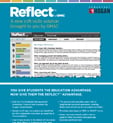 Over the past 12 months, Hogan has discussed a number of hot topics in the talent management arena. We’ve introduced you to an interesting, entertaining, and derailing cast of characters with howdoyouderail.com, and we’ve provided insight about engagement, team building, and organizational culture with our series on The Rocket Model. After reviewing the blog entries for this year, I compiled a list of Hogan’s Hottest, Hot Topics in 2012.
Over the past 12 months, Hogan has discussed a number of hot topics in the talent management arena. We’ve introduced you to an interesting, entertaining, and derailing cast of characters with howdoyouderail.com, and we’ve provided insight about engagement, team building, and organizational culture with our series on The Rocket Model. After reviewing the blog entries for this year, I compiled a list of Hogan’s Hottest, Hot Topics in 2012.
1. The Dark Side: Derailment and the Hogan Development Survey
This topic makes the top of the list because it is a real phenomenon. It is estimated that at least half of the individuals who are currently in leadership roles are failing or nearly derailing. The Dark Side (i.e. behaviors that emerge when we are under stress, pressure, or simply not self-monitoring) can rear its ugly head in a number of ways. We’ve all met the Loose Cannon, worked with the Show Off, or tried to deliver feedback to the Skeptic. These derailing behaviors can be career killers…literally. So it’s important that we focus on our reputation and self-awareness.
2. Self-Awareness: The value of understanding one’s reputation
One of the largest debates in the area of personality is that of identity and reputation. Identity relates to our values, goals, hopes, and dreams while reputation represents the behaviors that other people see that can either help or impede goal attainment. Reputation is what matters. It is what helps you climb the corporate ladder or go down the chute of derailment. We cannot modify our reputations without understanding why we do the things we do. Self-Awareness is the key to reconciling the differences between identity and reputation. Self-Awareness is the key to leadership success.
3. The Talent Management Gap: Building a high potential pipeline in a Millennial world
If you have doubts about the generational differences in the reliance on technology or the importance of social networking just ask any 10-year-old who wants an iPhone for Christmas, or consult the children’s toy aisle at your local big box store and you will find an assortment of Kindles, Nooks, and even iPad look-a-likes for babies. I can personally attest to this because my five-month-old received one from our friends for Christmas. There are differences in the way Millenials and eventually Generation Z will approach the work world. These groups have a significant reliance on technology, are highly affiliative, and require immediate and regular feedback. Jackie VanBroekhoven’s blog, The Generational Workforce of the Future, is a great illustration of the need to understand each of the generations representing the workforce in order to build the talent bench of the future.
4. Engagement: Focusing on the employee and the team
Employee engagement has been a hot topic for a number of years and it will likely become increasingly important as we see a shift in the make-up of the workforce. Engaged employees tend to be more satisfied and more productive, and productivity ties directly to the financial bottom line. The moral to the story is that morale and engagement matter and an employee’s engagement is largely driven by his/her boss. That being said, we need to focus on developing leaders who can empower and foster engagement in their staff.
What’s in store for 2013? We have a number of new and interesting topics to address next year, so stay tuned for more information from The Science of Personality. Until then, Happy Holidays from all of us at Hogan!
 Hogan and the Graduate Management Admission Council (GMAC) partnered to launch Reflect by GMAC, the first self-directed, personality-based development tool designed to bring the power of self-awareness to B-school students.
Hogan and the Graduate Management Admission Council (GMAC) partnered to launch Reflect by GMAC, the first self-directed, personality-based development tool designed to bring the power of self-awareness to B-school students.

 Over the past 12 months, Hogan has discussed a number of hot topics in the talent management arena. We’ve introduced you to an interesting, entertaining, and derailing cast of characters with
Over the past 12 months, Hogan has discussed a number of hot topics in the talent management arena. We’ve introduced you to an interesting, entertaining, and derailing cast of characters with 
 At the recent Conference Board in Chicago, a number of talent management professionals and consulting experts gave presentations on next-generation leadership. These discussions included a variety of topics, from recruiting generation Y and Millennial employees to social networking and overcoming the talent management gap as Baby Boomers retire. The common thread in these topics there were three recurrent questions 1) how do we develop next generation high potentials for senior leadership roles, 2) do we tell them they are high potentials, and 3) how will this impact their ability to be authentic leaders?
At the recent Conference Board in Chicago, a number of talent management professionals and consulting experts gave presentations on next-generation leadership. These discussions included a variety of topics, from recruiting generation Y and Millennial employees to social networking and overcoming the talent management gap as Baby Boomers retire. The common thread in these topics there were three recurrent questions 1) how do we develop next generation high potentials for senior leadership roles, 2) do we tell them they are high potentials, and 3) how will this impact their ability to be authentic leaders?